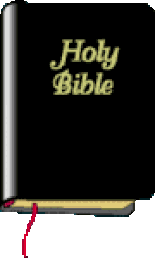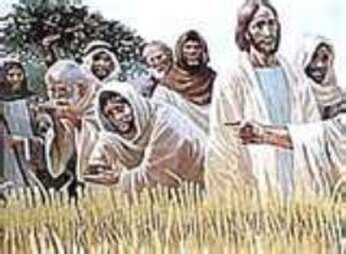Luke 5:27-6:11
Lesson 115
Lesson 115
Read both the "King James Bible" and the "New Living Translation."
In this lesson:
A new apostle.
Eating with sinners.
Plus;
The scribes and Pharisees witness another miracle,
but instead of recognizing the Messiah, they plot against Him.
A new apostle.
Eating with sinners.
Plus;
The scribes and Pharisees witness another miracle,
but instead of recognizing the Messiah, they plot against Him.
Plucking corn on the Sabbath.
Study Tip:
Always read the margin notes in blue.
Always read the margin notes in blue.
Who was -
Levi -
Usually called Matthew, his apostolic name. Matthew (meaning gift of God) was born a Jew in Galilee. He was the son of Alphaeus (Mark 2:14), and a wealthy tax collector working for the Romans in Capernaum (Matthew 9:9; Luke 5:27) when Jesus called him. Immediately after answering Jesus' call, Matthew "held a great banquet at his house" (Matthew 9:10; Mark 2:15; Luke 5:29) and then became the Messiah's traveling companion and record keeper. Although the Bible doesn't say so, biblical scholars credit Matthew as the author of "The Gospel According to Matthew." Matthew is last-named in Acts 1:13 as one of the twelve in the upper room after Jesus' ascension. It is uncertain whether Matthew died of natural causes or was killed for his Christian faith.
Levi -
Usually called Matthew, his apostolic name. Matthew (meaning gift of God) was born a Jew in Galilee. He was the son of Alphaeus (Mark 2:14), and a wealthy tax collector working for the Romans in Capernaum (Matthew 9:9; Luke 5:27) when Jesus called him. Immediately after answering Jesus' call, Matthew "held a great banquet at his house" (Matthew 9:10; Mark 2:15; Luke 5:29) and then became the Messiah's traveling companion and record keeper. Although the Bible doesn't say so, biblical scholars credit Matthew as the author of "The Gospel According to Matthew." Matthew is last-named in Acts 1:13 as one of the twelve in the upper room after Jesus' ascension. It is uncertain whether Matthew died of natural causes or was killed for his Christian faith.




